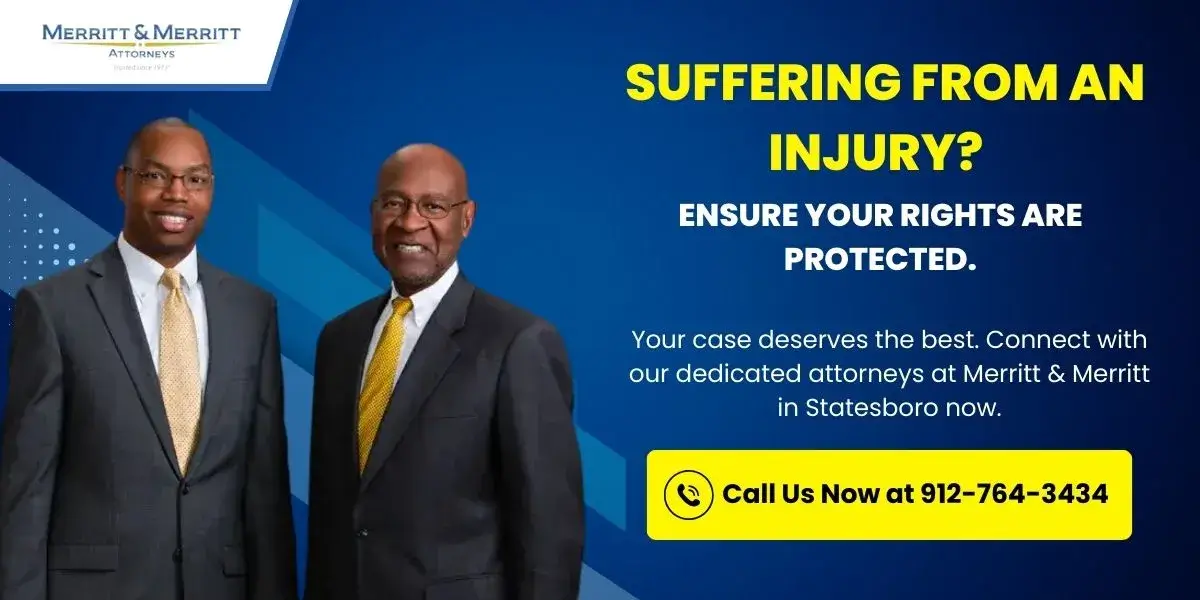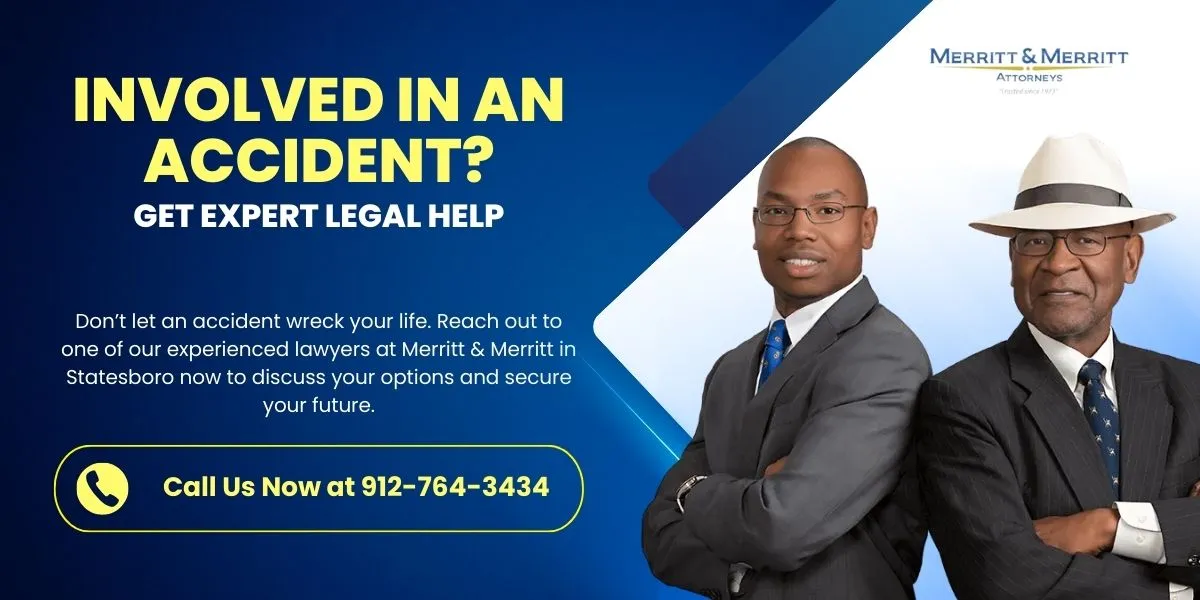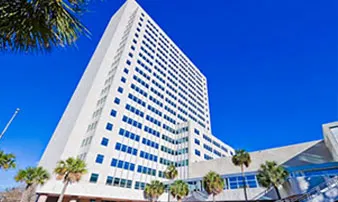Statesboro Motorcycle Accident Lawyer
Statesboro Motorcycle Accident Attorney
At Merritt & Merritt, we take pride in our deep community ties and in our reputation for serving clients across the State of Georgia who find themselves in need of high-powered legal help, no matter what their background or circumstances are. This includes motorcyclists and those involved in motorcycle accidents.
As enthusiasm for motorsports, and cycling in particular, remains high among younger generations and older bikers alike, accidents, unfortunately, remain an inevitable reality. In the aftermath of a serious tragedy, such as a motorcycle accident that results in a personal injury or long-term disability, you need a legal partner who understands not only the unique ins and outs of vehicular accidents involving motorcycles but also state and local traffic laws relevant to the case, the opaque workings of insurance carriers, and the local Georgia courts. That trusted partner is Merritt & Merritt, Attorneys at Law, working out of our main offices in Statesboro to serve citizens all across Georgia and beyond.

If you or someone you love has been seriously injured in a motorcycle accident, help and support is available. The Statesboro motorcycle accident lawyers at Merritt & Merritt are standing by to offer top-notch legal advice, airtight strategies for seeking maximum compensation, and diligent support in and out of the courtroom.
How Much Compensation Can I Get for a Motorcycle Accident in Statesboro, GA?
The total amount of compensation awarded to a victim (and/or punitive damages handed down by a judge pursuant to motorcycle accident injuries) in Statesboro or the surrounding roadways will largely depend on the specific factors in your case:
- The extent of injuries suffered – your payout after a motorcycle injury may include coverage for medical treatments, income lost due to the injury, and other economic factors related to your injury.
- Property damage – the extent of property damage that occurs in the accident (as well as how the damage occurs and whose property it is) can also be a major factor in calculating judgments and insurance payouts.
- Relevant criminal factors like DUI can exacerbate penalties, especially for repeat offenders.
- The quality of your legal team and their ability to negotiate effectively and argue in court can also have a major impact when it comes to maximizing a potential payout. In the State of Georgia, several different types of damages may potentially be relevant to the legal proceedings after an injurious accident. The Statesboro personal injury lawyers team at Merritt & Merritt of Statesboro can help you determine which might apply to your situation so that you can move forward through the complex legal process with the utmost confidence. Some types of damages that may be relevant to your motorcycle accident case include:
- Economic Damages: This refers to direct monetary losses like medical expenses and lost wages. For accidents resulting in long-term or permanent injuries, the cost of future ongoing medical treatments can also be factored in.
- Non-Economic Damages: These are intangible losses for more abstract or subjective matters such as pain and suffering or emotional distress. Proving these damages beyond a shadow of a doubt in the most effective way possible often requires soliciting solid evidence from expert witnesses, a process your legal team can assist with.
- Punitive Damages: Georgia law may also allow for punitive damages to be ordered in cases where the at-fault party exhibited behavior that was intentionally malicious or especially reckless. This type of penalty is handed down by the justice system in an effort to punish the wrongdoer and deter similar offenses in the future. It’s important to understand that punitive damages are fines imposed by the state and paid to the state and are a separate matter from any compensation awarded to a victim or plaintiff.
What Should I Do if I’m In a Motorcycle Accident in Statesboro?
Being involved in a motorcycle accident can be a frightening and extremely stressful experience, but it’s important to take swift and decisive action in the immediate aftermath if you are physically and mentally able to do so.
If you are a motorcyclist or other motorist who wants to be prepared for the worst, consider trying to commit this seven-step plan to memory:
- Personal Safety and First Aid – See to your own immediate safety and medical needs first of all, then stay calm, assess the situation as quickly as you’re able, and try to help anyone else who needs immediate assistance (such as someone trapped near an active fire or someone unable to move out of a busy roadway due to an injured leg). Unless you have specialized medical training, anything beyond these necessary basics should be left for emergency medical personnel to deal with. Never take it upon yourself to try to move someone who may have experienced a neck or back injury, for example, as exacerbating their injuries could potentially expose you to liability.
- Call for Help – Dialing 911 is typically the most efficient way to get emergency responders on the scene. Using 911 emergency services to get help for a motorcycle accident or other traffic mishap can get fire, EMT, and police services sent to the scene with a single phone call. Even if the accident seems minor to you and no emergency medical or rescue services are required, you’ll still want a police report as a reference for any insurance claims.
- Exchange Information – Collect the names, contact details, license plate info, and insurance carrier information of anyone else involved in the accident. If anyone is unwilling to cooperate, do not push the issue. Make a note of their refusal and move on. Do not engage in arguments or discussions of guilt with any other party on the scene. In fact, you should politely exchange information without discussing the details of the accident at all. The aftermath of a traumatic accident is not the time to try to figure out exactly what went wrong—leave that for your legal team to unravel using evidence.
- Document the Scene – Speaking of evidence, you can start the evidence-gathering process with nothing more than your smartphone’s camera in the immediate aftermath of the accident. Fully document the accident scene with high-resolution photographs, including crash debris, damage to vehicles and property, injuries, license plates, and anything else that seems relevant, unusual, or noteworthy. In addition to close-up details, make sure to get a few wide-angle shots to put the crash in context with scenery, signage, or landmarks. Share all of this with your lawyer as soon as possible so they can use it to build your case.
- Seek Non-Emergency Medical Attention – Once the chaos of the immediate aftermath of the accident settles sufficiently, you should go get checked out by a doctor. Find someone to drive you to the hospital if you don’t feel up to getting there yourself. Even if you feel okay right after the crash, there could be underlying injuries with symptoms that won’t manifest immediately, so it’s important to get checked out. Save detailed copies of all medical records pursuant to the accident and share these with your lawyer as well.
- Notify Your Insurance Carrier – File your insurance claim as soon as you’re reasonably able. The photos you took earlier may also come in handy when dealing with your insurance agent, so have those available. The exact procedures for filing a claim can vary a bit from carrier to carrier, so work through the process with direct guidance from your insurance agent. If at any point you find yourself feeling uncomfortable when dealing with insurance companies or their agents, you may wish to put the claims process on hold temporarily until you’ve spoken with your attorney.
- Consult Your Lawyer – If the first six steps haven’t gone smoothly, you may have already contacted your legal team at this point. Otherwise, now is the time to do so. The successful and capable personal injury and accident team at Merritt & Merritt of Statesboro can guide you through every step of the process with high-end legal advice and can aggressively advocate in and out of court for your rights and your future. Our reputation for success is directly tied to you getting the compensation you deserve, so we’re ready to fight diligently until you receive an adequate payout for your injuries.
For an Immediate Consultation call us at 912-764-3434
Putting Georgia Motorcycle Accidents in Legal Context
Georgia, much like other states in the US, has a set of specific laws and regulations that govern the operation and licensure of motorcycles. This is done in an effort to promote safety and awareness for these vehicles, which are statistically more dangerous to their riders than most other types of legal vehicles on Georgia’s roads.
Let’s break down some laws and rules that are often pertinent to motorcycle accident cases in the State of Georgia:
- State Helmet and Eyewear Requirements – Section 40-6-315 of Georgia’s Operational Code mandates that all motorcyclists need to wear a helmet when operating their bikes. That goes for any passengers as well, and not just any helmet will do. To be in compliance, helmets used in Georgia must meet specific criteria set forth by a public safety board. This rule is extended by the next section, 40-6-316, which states that riders must also be equipped with protective eyewear, in addition to approved helmets, unless their motorcycle has an adequate windscreen/windshield.
- Lane Splitting – Lane splitting is the act of riding between two lanes of traffic (something that only a motorcycle is really capable of due to its unique dimensions). Traffic lanes are delineated for a reason, so it should not surprise you to learn that lane splitting is explicitly illegal in Georgia and many other states.
- Handlebar Height – The Georgia Operational Code also sets standards for motorcycle parts and equipment. Section 40-6-314 specifically deals with handlebar height and positioning. In the State of Georgia, it is not authorized for a motorcycle’s handlebars to be installed in a way that forces the operator’s hands above their shoulders during normal operation. This effectively outlaws some of the more extreme “chopper” style builds that can be dangerous for inexperienced bikers to handle.
- Education Requirements – Those applying for their Georgia motorcycle license for the first time are also required to complete a state-approved motorcycle training course. This is similar to the driver’s education process for passenger cars.
- DUI/OWI – It should go without saying that operating a motorcycle under the influence of alcohol or drugs is not permitted in the state of Georgia. Getting a DUI charge pursuant to your motorcycle accident can severely impact your potential for a successful injury claim, especially if you’re at fault for the accident. Conversely, the chances of a quick and fair settlement can increase if a driver who injures you is charged with DUI.
- Insurance Requirements – Georgia requires motorcyclists and other motorists to maintain a state-mandated minimum amount of liability insurance. At a minimum, a Georgia biker must carry a policy with $50,000 in coverage for total bodily injuries, as well as $25,000 each in coverage for property damage and bodily injury to a single person.
- Federal Motor Vehicle Safety Standards – On a national standard, motorcycles must also adhere to standards related to lighting, brakes, and emissions. Due to a culture of heavy customization in motorcycling circles, sometimes, bikes that were street-legal when sold by the manufacturer can fall below regulatory standards after being modded or upgraded. If you’re getting work done on your bike, it’s important to know how to keep your custom bike street-legal under local ordinances, state laws, and federal regulations.
How Painful Is a Motorcycle Accident in Statesboro, GA?
Motorcycle accidents, because they lack the protective element offered by car bodies and truck cabs, sadly result in severe injuries on a fairly routine basis.
The pain experienced by an individual as a consequence of these injuries will vary widely based on a variety of factors, including:
- The nature of the accident
- The extent of injuries suffered
- The individual’s role in the accident
- Safety equipment used (or not used)
- The individual’s pain tolerance and other personal physiological factors
Perhaps the single most important factor to consider when talking about pain levels for motorcycle accident injuries is the type of injury sustained.
Some common types of motorcycle injuries include:
- Road Rash: This type of injury occurs when a rider slides across pavement or other abrasive surfaces and lacks adequate protective gear to fully shield them from injury. Road rash injuries are usually quite painful, but, on the bright side, most do not result in lasting impairment (although more serious cases can require surgery to repair damaged tissue).
- Bone Fractures: Due to the impact of multiple vehicle crashes or the impact of a rider being thrown from their bike, bone fractures are another common injury in motorcycle crashes. Broken legs, arms, and collarbones are common, with broken neck, skull, or spinal bones often being more serious or linked to additional injuries that are not purely skeletal in nature. All types of fractures have two things in common: they are painful to experience and require medical treatment to repair properly.
- Head, Brain, and Spine Injuries: Some of the most serious motorcycle injuries, including those resulting in total or partial paralysis, involve damage to the head or spine. Properly fitted, high-quality motorcycle helmets can greatly reduce the risk of many types of head injuries, but even the safest riders need to accept that no helmet law can eliminate the possibility of concussions and other head injuries entirely.
Whatever type of motorcycle accident you’ve been involved in, the compassionate and qualified team at Merritt & Merritt of Statesboro understands what you’re going through. That’s because we’ve helped Georgians before you get through similar situations and come through the other side with the support and financial compensation required to recover from serious injuries and rebuild their lives.
For us, the immense physical pain experienced by victims of motorcycle accidents, coupled with the emotional trauma and potential for long-term disability, is not an indictment of motorcycling as a sport or as a community but an important wake-up call for all motorists and pedestrians; one that underscores the importance of taking motorcycle safety seriously.

Merritt & Merritt, Attorneys at Law – Capable Personal Injury Help in the Courtroom and Beyond
At Merritt & Merritt, our commitment to the people of Georgia doesn’t stop at the courtroom doors. Our philosophy and approach to the business end of law is rooted deeply in the communities we serve because our highly qualified attorneys and friendly, knowledgeable legal support staff are also members of those communities. That’s why we believe in extending a helping hand that goes beyond just providing world-class legal services to our clients. Our dedication to the well-being of Statesboro and the surrounding communities is evident in our participation in local charities and nonprofit work just as much as it is in the courtroom.
Even a relatively minor motorcycle accident can be a life-altering and traumatic experience. As you navigate the complex layers of legal motions and insurance paperwork, it can be crucial to have a trusted partner like Merritt & Merritt on your side.
Reach out today, and we can get started making sure your rights, safety, and future are protected and placed at the forefront of any legal proceedings to come. From filing your initial accident claim to fighting for the maximum possible compensation package at the negotiating table or even asserting your rights at trial if need be, Merritt & Merritt offers high-powered, custom-tailored, and judgment-free legal solutions.
Statesboro Motorcycle Accident Resources
- Statesboro Police Department
25 W Grady St,
Statesboro, GA 30458
Phone: +1 912-764-9911 - Statesboro Health Department
1 W Altman St,
Statesboro, GA 30458
Phone: +1 855-473-4374





